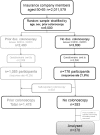Patient-rated importance of key information on screening colonoscopy in Germany: a survey of statutory health insurance members
- PMID: 30007923
- PMCID: PMC6082454
- DOI: 10.1136/bmjopen-2017-019127
Patient-rated importance of key information on screening colonoscopy in Germany: a survey of statutory health insurance members
Abstract
Background: Primary colonoscopic screening is considered to be of great benefit but also has the potential to cause severe harm. Thus, eligible subjects should be supported in making an informed choice whether to participate.
Objectives: To identify information on screening colonoscopy that colonoscopy-naïve subjects rate as particularly important for decision making.
Design: Survey of German statutory health insurance members using a written questionnaire in November 2015.
Study population: Colonoscopy-naïve individuals aged 50 to 65 years.
Main outcome measures: Importance of key information about screening colonoscopy, including potential risks and benefits, baseline risk of colorectal cancer/polyps and practical aspects of the procedure, as well as associations between participants' characteristics and their judgement of information as to being 'very important'.
Results: Of 1871 respondents (overall response rate: 31%), a subgroup of 370 colonoscopy-naïve subjects was eligible for inclusion (average age: 55 years, 47% male). Information on the risks was rated as very important by most respondents, unimportant by 6%. Information on the benefits was considered unimportant by 26%. Regression analysis showed that less educated persons regarded most items to be more often relevant than highly educated subjects. A greater proportion of women than men rated details regarding pain and practical aspects as very important. Subjects with a low educational level living alone were identified as the group with the least interest in information on risks.
Conclusion: Cultivating awareness around the central meaning of the (quantitative) benefits of screening in informed decision making should be focused on more in future information materials. The high requirement of less educated people to become more informed provides a strong motivation for further efforts to develop evidence-based information that adequately informs this group. Tailoring information according to gender-specific needs may be warranted in light of the observed differences in information preferences between women and men.
Keywords: colonoscopy; colorectal cancer; decision aids; early diagnosis; preventive medicine; screening.
© Author(s) (or their employer(s)) 2018. Re-use permitted under CC BY-NC. No commercial re-use. See rights and permissions. Published by BMJ.
Conflict of interest statement
Competing interests: None declared.
Figures





Similar articles
-
Community-based preferences for stool cards versus colonoscopy in colorectal cancer screening.J Gen Intern Med. 2008 Feb;23(2):169-74. doi: 10.1007/s11606-007-0480-1. Epub 2007 Dec 21. J Gen Intern Med. 2008. PMID: 18157581 Free PMC article.
-
Factors Associated with Informed Decisions and Participation in Bowel Cancer Screening among Adults with Lower Education and Literacy.Med Decis Making. 2014 Aug;34(6):756-72. doi: 10.1177/0272989X13518976. Epub 2014 Jan 13. Med Decis Making. 2014. PMID: 24421292 Clinical Trial.
-
The impact of personalised risk information compared to a positive/negative result on informed choice and intention to undergo colonoscopy following colorectal Cancer screening in Scotland (PERICCS) - a randomised controlled trial: study protocol.BMC Public Health. 2019 Apr 16;19(1):411. doi: 10.1186/s12889-019-6734-0. BMC Public Health. 2019. PMID: 30991987 Free PMC article.
-
Positive family history of colorectal cancer in a general practice setting [FRIDA.Frankfurt]: study protocol of a of a cross-sectional study.BMC Cancer. 2015 Aug 28;15:605. doi: 10.1186/s12885-015-1600-7. BMC Cancer. 2015. PMID: 26314581 Free PMC article. Clinical Trial.
-
[The population perspective in assessing the performance of Germany's health care system: Results of a cross-sectional survey among members of a statutory health insurance].Z Evid Fortbild Qual Gesundhwes. 2024 Jun;187:22-33. doi: 10.1016/j.zefq.2024.04.004. Epub 2024 May 31. Z Evid Fortbild Qual Gesundhwes. 2024. PMID: 38824093 German.
Cited by
-
Harms and Benefits of Cancer Screening.Recent Results Cancer Res. 2021;218:85-104. doi: 10.1007/978-3-030-63749-1_7. Recent Results Cancer Res. 2021. PMID: 34019164
-
Attributes Characterizing Colorectal Cancer Screening Tests That Influence Preferences of Individuals Eligible for Screening in Germany: A Qualitative Study.Patient Prefer Adherence. 2022 Aug 10;16:2051-2066. doi: 10.2147/PPA.S365429. eCollection 2022. Patient Prefer Adherence. 2022. PMID: 35975173 Free PMC article.
References
Publication types
MeSH terms
LinkOut - more resources
Full Text Sources
Other Literature Sources
Medical
